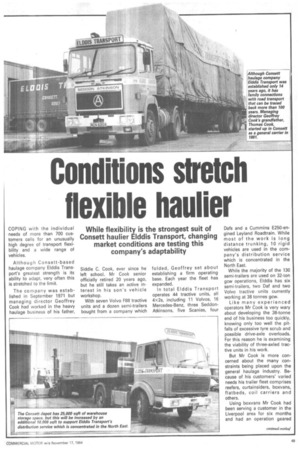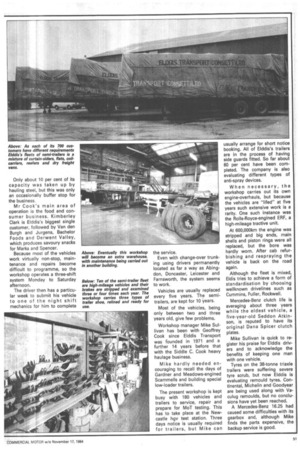Conditions stretch flexible haulier
Page 51

Page 52

Page 53

If you've noticed an error in this article please click here to report it so we can fix it.
While flexibility is the strongest suit of Consett haulier Elddis Transport, changing market conditions are testing this company's adaptability
COPING with the individual needs of more than 700 customers calls for an unusually high degree of transport flexibility and a wide range of vehicles.
Although Consett-based haulage company Elddis Transport's greatest strength is its ability to adapt, very often this is stretched to the limit.
The company was established in September 1971 but managing director Geoffrey Cook had worked in the heavy haulage business of his father, Siddle C. Cook, ever since he left school. Mr Cook senior officially retired 20 years ago, but he still takes an active interest in his son's vehicle workshop.
With seven Volvo F88 tractive units and a dozen semi-trailers bought from a company which folded, Geoffrey set about establishing a firm operating base. Each year the fleet has expanded.
In total Elddis Transport operates 44 tractive units, all 4x2s, including 11 Volvos, 16 Mercedes-Benz, three SeddonAtkinsons, five Scanias, four Oafs and a Cummins E250-engined Leyland Roadtrain. While most of the work is long distance trunking, 10 rigid vehicles are used in the company's distribution service which is concentrated in the North East.
While the majority of the 130 semi-trailers are used on 32-ton gcw operations, Elddis has six semi-trailers, two Daf and two Volvo tractive units currently working at 38 tonnes gcw.
Like many experienced operators Mr Cook is very wary about developing the 38-tonne end of his business too quickly, knowing only too well the pitfalls of excessive tyre scrub and possible drive-axle overloads. For this reason he is examining the viability of three-axled tractive units in his work.
But Mr Cook is more concerned about the many constraints being placed upon the general haulage industry. Because of his customers' varied needs his trailer fleet comprises reefers, curtainsiders, boxvans, flatbeds, coil carriers and others.
Using boxvans Mr Cook had been serving a customer in the Liverpool area for six months and had an operation geared up to carry back loads from the North East.
Without warning the customer decided, apparently for aesthetic reasons, that all delivery vehicles working for him should be curtain-siders. Because the outward loads could not be carried in these vehicles, this caused a considerable upheaval and a cash outlay for which there was no increased return.
Haulage companies are also doing more of the administration work that years ago customers did themselves. Goods collection/delivery scheduling and the telexing of delivery details are examples.
Customers who have reduced, even eliminated, their own transport operation have economised at the expense of stretching hauliers' flexibility.
What is particularly galling to Mr Cook is when one of his drivers 'phones in from, say, Portsmouth or Bristol on a Friday afternoon to say that the storeman will not accept his load until Monday morning. A telephone call to the client rarely helps because he generally does not wish to cause problems "and so the man on the back door is never brought to task."
"Of course they offer us demurrage at the standard rate, but it is the time lost which is more important", said Mr Cook. "What is worse, is that drivers are usually treated badly into the bargain."
Elddis's drivers, through no fault of their own, usually spend more time tipping and off-loading than behind the wheel. For that reason Mr Cook believes hauliers ought to be able to charge a three-tier schedule that covers loading, trunking and unloading.
"I believe that the haulage in dustry can make more economies", he said, "but it can only be with the customer's total cooperation."
The company finds its membership of the Transport Association beneficial in many ways, as well as offering a mutual repair, fuelling, parking and general assistance agreement between the membership, it provides a forum for information.
Regular, separate meetings are held for all areas of management which manufacturers representatives attend. Mr Cook must surely be hoping that the major oil companies will attend one day to listen to his views on the charges for diesel.
It is not so much the rising price of dery which irritates Mr Cook, but more the way that a letter arrives out of the blue to say without any forewarning that the price went up from midnight the previous night. "But if I did the same to my rates, I would be out of work in no time," he said.
When British Steel closed its Consett works, the effect on the area was, and still is, devastating, but because Elddis Transport's line was general haulage its work continued normally. Only about 10 per cent of its capacity was taken up by hauling steel, but this was only an occasionally buffer stop for the business.
Mr Cook's main area of operation is the food and consumer business. Kimberley Clark is Elddis's biggest single customer, followed by Van den Burgh and Jurgens, Bachelor Foods and Derwent Valley, which produces savoury snacks for Marks and Spencer.
Because most of the vehicles work virtually non-stop, maintenance and repairs become difficult to programme, so the workshop operates a three-shift system Monday to Saturday afternoon.
The driver then has a particular week to submit his vehicle to one of the night shift mechanics for him to complete the service.
Even with change-over trunking using drivers permanently located as far a way as Abingdon, Doncaster, Leicester and Farnsworth, the system seems to work.
Vehicles are usually replaced every five years. The semitrailers, are kept for 10 years.
Most of the vehicles, being only between two and three years old, give few problems.
Workshop manager Mike Sullivan has been with Geoffrey Cook since Elddis Transport was founded in 1971 and a further 14 years before that with the Siddle C. Cook heavy haulage business.
Mike hardly needed encouraging to recall the days of Gardner and Meadows-engined Scammells and building special low-loader trailers.
The present workshop is kept busy with 180 vehicles and trailers to service, repair and prepare for MoT testing. This has to take place at the Newcastle hgv test station. Three days notice is usually required for trailers, but Mike can usually arrange for short notice booking. All of Elddisrs trailers are in the process of having side guards fitted. So far about 60 per cent have been completed. The company is also evaluating different types of anti-spray devices.
When necessary, the workshop carries out its own engine-overhauls, but because the vehicles are "lifed" at five years such extensive work is a rarity. One such instance was the Rolls-Royce-engined ERF, a high-mileage tractive unit.
At 600,000km the engine was stripped and big ends, main shells and piston rings were all replaced, but the bore was hardly worn. After cab refurbishing and respraying the vehicle is back on the road again.
Although the fleet is mixed, Eldis tries to achieve a form of standardisation by choosing wellknown drivelines such as Cummins, Fuller, Rockwell.
Mercedes-Benz clutch life is averaging about three years while the eldest vehicle, a five-year-old Seddon Atkinson, is reputed to have its original Dana Spicer clutch plates.
Mike Sullivan is quick to register his praise for Elddis drivers and to acknowledge the benefits of keeping one man with one vehicle.
Tyres on the 38-tonne triaxle trailers were suffering severe tyre scrub, but now Elddis is evaluating remould tyres. Continental, Michelin and Goodyear are being used along with Vaculug remoulds, but no conclusions have yet been reached.
A Mercedes-Benz 16.25 had caused some difficulties with its gearbox and, although Mike finds the parts expensive, the backup service is good.












































































































